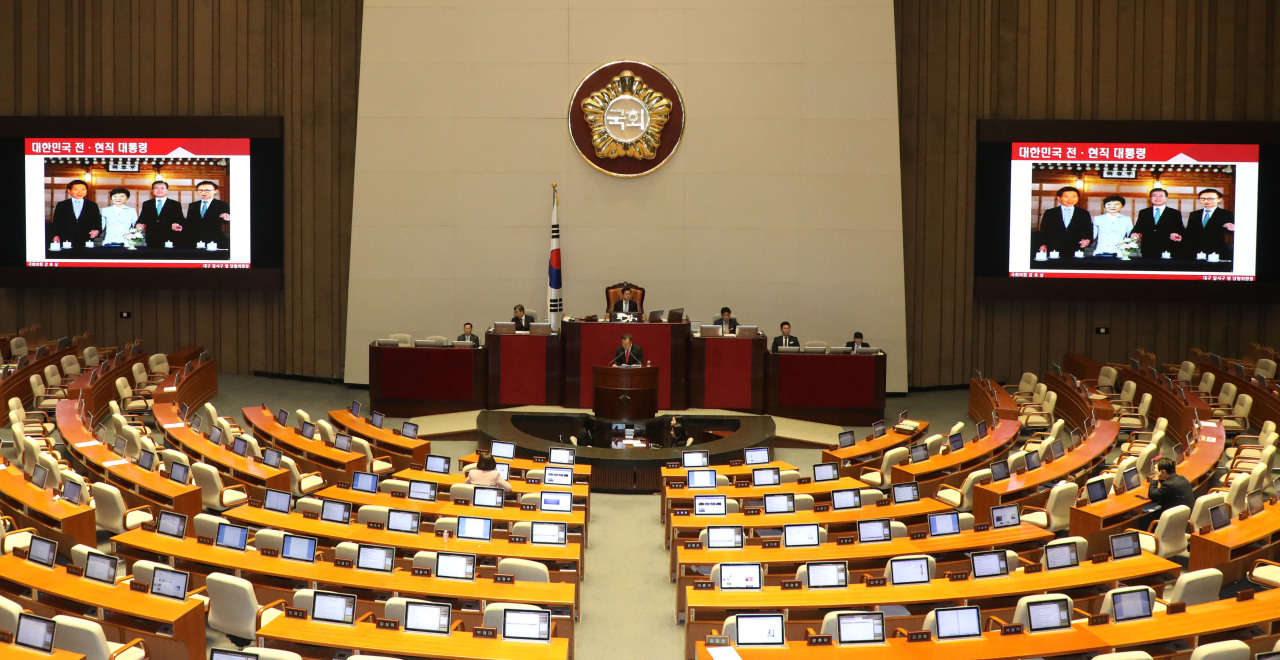National Assembly to vote on controversial bill to set up corruption probe unit
By YonhapPublished : Dec. 30, 2019 - 13:33
The National Assembly is set to vote on a contentious bill to set up a separate unit to probe corruption by high-ranking public officials Monday, amid protests from lawmakers of the main opposition party.
A plenary session for a parliamentary vote is scheduled at 6 p.m.
The vote comes about eight months after the ruling party-led bloc placed related prosecution reform bills on a legislative fast track in late April, along with an electoral reform bill.
The establishment of the proposed corruption probe unit is aimed at overhauling the prosecution, one of the key election pledges by President Moon Jae-in.

The quorum for the passage is 148 members of the 295-member assembly.
The conservative Liberty Korea Party blocked a vote on the bill with a filibuster on Friday when National Assembly Speaker Moon Hee-sang introduced it to a plenary meeting.
Under parliamentary rules, the party cannot use such obstructive tactics with the same bill on Monday as a new extra session began a day earlier.
The conservative LKP has vehemently opposed the measure as it fears the proposed probe unit will wield excessive authority and that a president could control the judiciary and prosecution sectors with his right to appoint the head of the agency.
Under the bill, the proposed unit will be empowered to investigate corruption committed by ranking public officials, including the president, lawmakers, top court justices and prosecutors. Among them, the agency can directly indict police, prosecutors and judges.
A seven-member committee to recommend the chief of the unit will be formed, and the president will select one of two candidates who receive support from six panel members. A parliamentary confirmation hearing is needed for appointment.
The bill also obliges the prosecution to report to the proposed probe unit all of its information on suspected crimes by high-ranking officials under its investigation, in what critics have called a "poisonous" clause.
If the bill is passed, the envisioned unit is expected to set sail around July next year. (Yonhap)






![[From the Scene] Monks, Buddhists hail return of remains of Buddhas](http://res.heraldm.com/phpwas/restmb_idxmake.php?idx=644&simg=/content/image/2024/04/19/20240419050617_0.jpg&u=20240419175937)





![[Graphic News] French bulldog most popular breed in US, Maltese most popular in Korea](http://res.heraldm.com/phpwas/restmb_idxmake.php?idx=644&simg=/content/image/2024/04/18/20240418050864_0.gif&u=)



![[From the Scene] Monks, Buddhists hail return of remains of Buddhas](http://res.heraldm.com/phpwas/restmb_idxmake.php?idx=652&simg=/content/image/2024/04/19/20240419050617_0.jpg&u=20240419175937)

![[KH Explains] Hyundai's full hybrid edge to pay off amid slow transition to pure EVs](http://res.heraldm.com/phpwas/restmb_idxmake.php?idx=652&simg=/content/image/2024/04/18/20240418050645_0.jpg&u=20240419100350)

![[Today’s K-pop] Illit drops debut single remix](http://res.heraldm.com/phpwas/restmb_idxmake.php?idx=642&simg=/content/image/2024/04/19/20240419050612_0.jpg&u=)